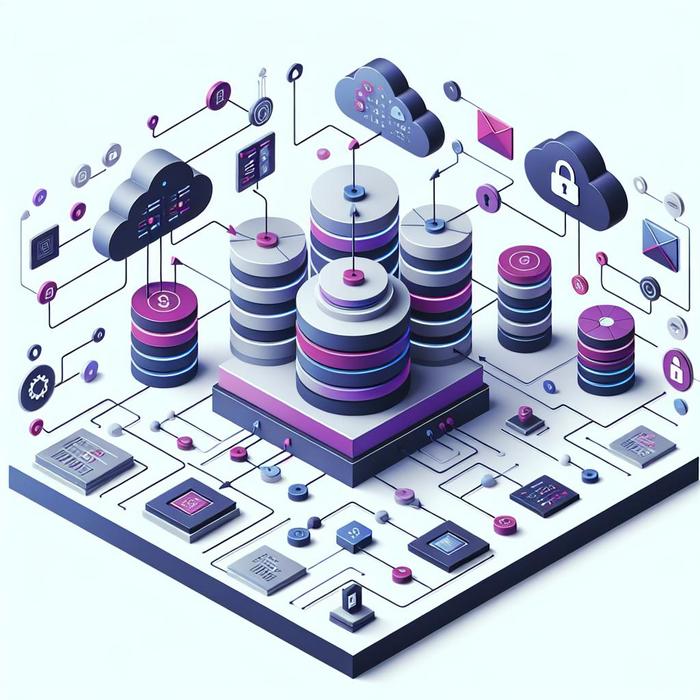Table of Contents Hide
Guaranteeing Data Integrity in Enterprise Databases
 7 MIN. READING
7 MIN. READING
Why Is Maintaining Data Integrity in Databases So Essential for Strategic Decision-Making?
Data integrity is not just a priority—it’s an essential component of business strategy. It lays the foundation for informed decision-making, risk management, and compliance. But how can you ensure data integrity in the face of rapid data growth, increasing regulatory demands, and complex data infrastructures? The solution lies in harnessing the power of advanced data solutions for database integrity assurance.
A Deeper Look at Database Virtualization as a Solution
Database virtualization presents a revolutionary approach to data infrastructure. It creates a virtual layer that offers unified access to diverse data sources, eliminating the need for time-consuming and resource-draining data replication or movement. This provides rapid and efficient data provisioning, which is critical in areas such as testing and development, analytics, and more.
By creating a consistent, non-redundant, and accurate data environment, database virtualization plays a crucial role in maintaining data integrity. It ensures that data is reliable, consistent, and up-to-date, which is critical when it comes to strategic decision-making. Here are some best practices that can help organizations maintain data integrity effectively.
The Role of Data Anonymization in Maintaining Data Integrity
While data integrity is crucial, so is ensuring the privacy and security of the data. This is where data anonymization comes into play. Data anonymization refers to techniques used to prevent sensitive data from being accessed or disclosed during data processing.
Data anonymization involves replacing identifiable data with artificial identifiers or completely eliminating identifiable elements, ensuring the data stays useful while preserving privacy. This is especially relevant considering the stringent data protection regulations that large organizations must comply with.
How to Choose the Right Platforms for Your Unique Data Needs
Choosing the right platforms for data integrity assurance and data anonymization is not a one-size-fits-all decision. Various factors to consider include the size and complexity of your data infrastructure, the nature of the data you handle, your specific data needs, and the level of customizability you require.
Some platforms stand out for their robust functionality, flexibility, scalability, and ease of use. Others may offer unique features suited to specific industries or data scenarios. The most important thing is to select a platform that aligns with your strategic goals and operational demands. Here are some strategies that can guide you in making this vital decision.
The Role of Agile Strategies in Optimizing Data Operations
To optimize your data operations and maintain data integrity, an agile approach is paramount. Agile strategies enable organizations to respond quickly to changes in the data landscape, whether it’s regulatory changes, data growth, or evolving business needs. Agile strategies promote continuous improvement, testing, and adaptation, which is critical in today’s fast-paced business environment.
Driving Transformation through Data Innovations
Database virtualization and data anonymization are just two of the many advanced data solutions that are transforming the way organizations handle data. These solutions empower enterprises to address complex data challenges head-on, ensuring data integrity, improving efficiency, and driving strategic decision-making.
Data–it’s not just about having it. It’s about leveraging it strategically by maintaining its integrity, protecting its privacy, and optimizing its use. Utilizing advanced data solutions is not just another task on the to-do list, it is a strategic necessity. Investing in the right strategies and tools that uphold data integrity can lead to concrete results in the form of data-driven insights, optimized operations, and improved decision-making.
The question is not whether to leverage these advanced solutions, but how to do so effectively and strategically, for the maximum advantage. Let this guide serve as a roadmap for your organization’s journey towards effective data management and integrity assurance.
Where data that forms the basis of business strategy and decision-making, maintaining data integrity isn’t just an aspiration–it’s a necessity. It’s time to secure your data powerfully– the strategic, agile, and smart way.
Security: The Undeniable Requirement for Data Integrity
When discussing data integrity, an aspect that inevitably comes to the fore is data security. With cyber threats on the rise, protecting sensitive data is paramount for large organizations. Furthermore, maintaining the highest levels of data security isn’t just about safeguarding against breaches or theft—it’s about preserving data integrity throughout an organization.
Implementing robust security frameworks, encryption methodologies, and firewalls and frequently performing vulnerability assessments can make the environment more secure. However, data security should not end here. Regular audits, risk assessments, and disaster recovery strategies should be in place to ensure the continued integrity of data now and into the future. This resource provides deeper insights on how security aids data integrity.
Innovative Strategies Driving Data Integrity Forward
With data configurations becoming more complex year after year, the strategies needed for effective test data functionality must also evolve. Advanced Data handling techniques including advanced automation strategies and implementing advanced data techniques with built-in scalability offer agile solutions. They help in maintaining the integrity of data even when dealing with a large amount of data in real-time applications.
Additionally, syncing data across multiple platforms and databases and keeping it updated at all times is a comprehensive strategy to ensure data integrity. Furthermore, unique identifiers and checkpoints can be used to track changes to data over time and thus maintain its accuracy. This article elaborates on data integrity tactics and the prospects they hold.
Database Virtualization and Compliance
When it comes to complying with data regulations, database virtualization emerges as a standout solution. It simplifies compliance by providing a unified view of all data, regardless of its location or format. This single-source-of-truth aspect is incrementally beneficial when adhering to regulatory reporting requirements.
Database virtualization also aids in reviewing, responding, and rectifying any potential non-compliance issues swiftly and effectively. This, in turn, further fortifies data integrity and optimizes strategic decision-making. For more information on the integral relationship between database virtualization and compliance, visit this link.
The Correlation Between Data Anonymization and Data Infrastructure
Data infrastructure and data anonymization are two interconnected components of the data integrity spectrum. An effective data infrastructure strategy begins with good database design and extends to the successful implementation of data anonymization processes. This ensures that data gathered from various sources, when processed, retains its integrity without compromising the privacy of its individuals.
Advanced data solutions assure that data in transit and at rest is anonymized and protected from unauthorized access. Achieving this level of standardization in data sets undoubtedly contributes to preserving data integrity, thereby driving the decision-making process in the right direction. Check out these efficient data provisioning techniques.
The Future of Data Integrity – Machine Learning and AI
Machine learning (ML) and artificial intelligence (AI) are permeating numerous sectors, and rightfully so. These technologies have immense potential in maintaining, analyzing, and optimizing data architecture and integrity. By integrating AI-based systems into an organization’s strategic plans, businesses can ensure data integrity at unprecedented levels.
From detecting anomalies in large data sets to validating data sources’ reliability, artificial intelligence and machine learning are opening new doors to a future where data integrity is the norm, not the exception.
Leveraging these cutting-edge technologies, organizations can be more proactive in their data management, aligning themselves with technological advancements and trends. Ultimately, integrating these elements into an organization’s strategic agenda bolsters data integrity and propels data-driven decision-making to new heights.
Securing Data Integrity for the Long Haul
There’s no denying the profound role that data integrity plays in the modern business landscape. It’s the driving force behind informed decision-making, a catalyst for strategic growth, and a guard against compliance risks. As data infrastructures evolve and become more complex, the need for solutions that ensure data integrity also escalates.
Therefore, adopting database virtualization, implementing rigorous data anonymization processes, choosing the right platforms, and integrating advanced technologies such as AI and ML should be a strategic priority. These factors together contribute towards a robust data integrity framework that ensures reliable, consistent, and timely data – the trifecta of strategic decision-making.
Unquestionably, upholding data integrity and security in an increasingly data-driven world isn’t just desirable – it’s an absolute imperative. And embarking on this journey the right way could mean the difference between merely keeping pace and leading in a data-fueled future. To help guide your way, explore this resource on transforming test data management.


